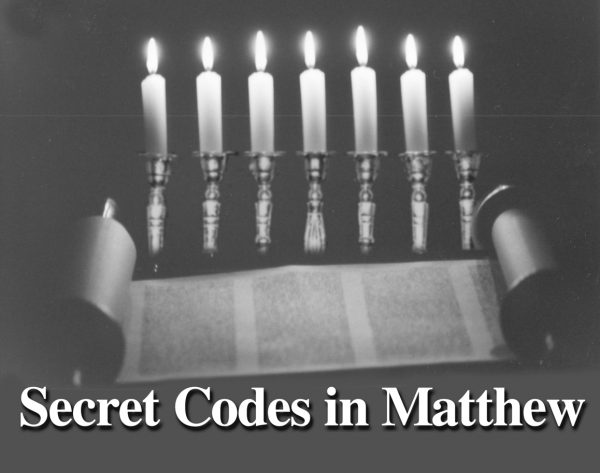The Secret Codes in Matthew: Examining Israel’s Messiah, Part 6: Matthew 5:21-7:29, by Kevin M. Williams

Part Five of the series examined Yeshua’s1 proclamation, “Do not think that I came to abolish the Law or the Prophets; I did not come to abolish, but to fulfill” (Matthew 5:17). We examined that this statement has, over the centuries, given many believers the impression that Yeshua did away with or annulled the Torah. Many have come to believe that its instructions and commandments are “inoperative” for today’s believer.
Christians have always been amazed and irritated by these words. Marcion, a theologian from the second century who rejected both the Old and a large portion of the New Testament as being too Jewish, was of the opinion that Jesus only could have said the opposite: that he had not come to fulfill the law but to annul it. Likewise, Rudolf Bultmann, one of the most influential exegetes of the twentieth century, thought that the statement could not possibly have been made by Jesus but that it had been ascribed to him by Judaizing Christians. Both of these theologians assumed that Jesus fundamentally rejected the Jewish law.2
Before we look into the ancient Hebrew perspective and potential understanding of Yeshua’s words and teachings—and join the “amazed and irritated”—it is important to keep one reality at the forefront. What you are about to read cannot at any time be separated from the crucial reality of God’s grace found through the shed blood of the Messiah. As we shall explore in the next issue of Pneuma Review, the form and function of some of the Torah began to take a new shape. The application of many of the biblical commandments—particularly in relationship to worship and sacrifice—took on a reality far beyond anything anyone in Israel had likely considered up to that age.
Lest anyone think that the following discourse discounts grace—far be it! If anything, Yeshua’s instructions throughout Matthew chapters 5-7 demonstrate quite clearly how totally depraved even the most conscientious and religiously observant human was or is, and how woefully insufficient works alone are.
___
In Part Five, we discovered that the phrase “I did not come to abolish but to fulfill” was a common euphemism used both in the first century and today in synagogues and yeshivas. A person who “abolished” the Torah was essentially teaching heresy.
“Annulling” a text from Scripture is also a rabbinic term, indicating that someone goes too far in interpreting a text and thereby actually decommissions it.3
On the other hand, a person who “fulfilled” the Torah had confirmed the Word in such a way that brought clarity and depth to its meaning. It blessed the assembly and helped them understand God’s Word in more relevant and applicable ways.
Yet another way of looking at this word “fulfill” is to find Old Testament parallels. The text Matthew uses is the Greek word pleroo (πλεροο, #4137 in the Strong’s). While it certainly can be translated as “fulfill,” it also means, “cause to abound, supply liberally, or bring to realization.”
But good exegesis demands that the Bible interpret itself. One apologist suggests that the Septuagint equivalent may have been the Hebrew word kum (םוק), meaning “to establish” or “confirm” based on its usage in both the Old Testament and the Mishnah. This same author writes, “If Yeshua used the word kum when He made His famous statement about ‘fulfilling’ the Torah and the Prophets, then He clearly meant that He came not to set the Torah aside but to establish the Torah, to confirm it, to see that it was carried out or obeyed the way God intended.”4
He is quick to point out that pleroo in the Greek Septuagint however, is not always translated not as kum, but as malei (אלמ). Malei is almost universally used as finishing something as far as it can be completed. If Yeshua was using the Hebrew parallel malei, rather than kum, new understanding may begin to take shape.
1 Kings 1:14 reads, “Behold, while you are still there speaking with the king, I will come in after you and confirm [malei] your words.” Jeremiah 44:25 reads similarly, “Thus says the Lord of hosts, the God of Israel, as follows: ‘As for you and your wives, you have spoken with your mouths and fulfilled [malei] it with your hands, saying, “We will certainly perform our vows that we have vowed, to burn sacrifices to the queen of heaven and pour out libations to her.” Go ahead and confirm [kum] your vows, and certainly perform your vows!’”
While on the one hand the word malei may mean complete as in “finish and be done with,” it is also used to “establish” or “confirm” a word or a vow. In this context, drawing parallels from the Greek pleroo to its potential Hebrew counterparts, kum or malei, we can equally and accurately derive the understanding, “to establish” or “confirm.”
Category: Biblical Studies, Pneuma Review, Summer 2002


